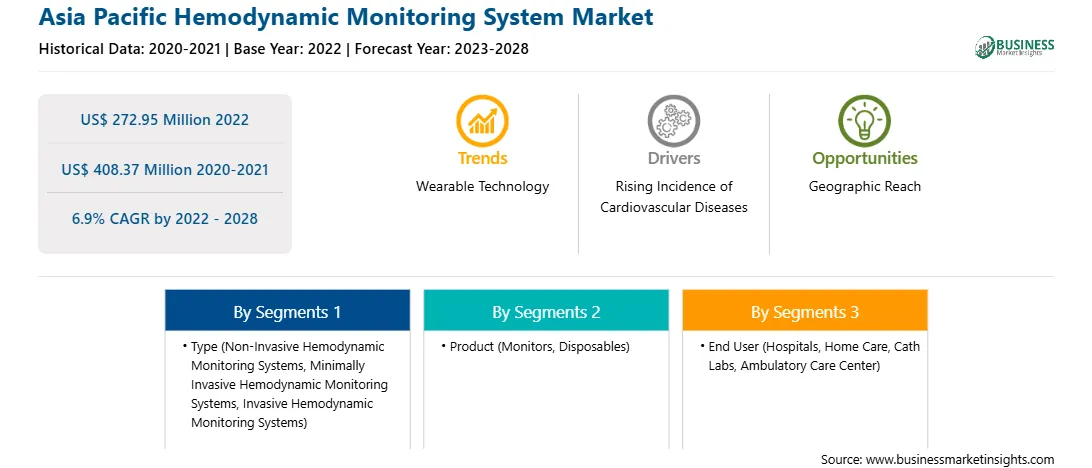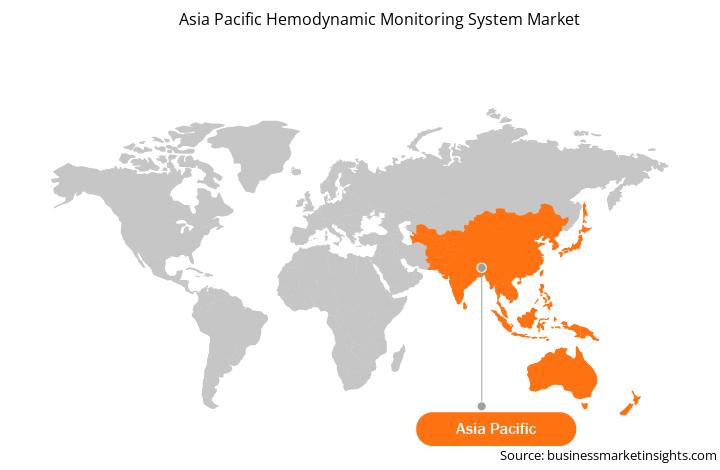亚太地区血流动力学监测系统市场预测至 2028 年 – COVID-19 影响和区域分析 – 按类型(非侵入性血流动力学监测系统、微创血流动力学监测系统和侵入性血流动力学监测系统)、产品(监视器和一次性用品) )和最终用户
No. of Pages: 163 | Report Code: BMIRE00028100 | Category: Life Sciences
No. of Pages: 163 | Report Code: BMIRE00028100 | Category: Life Sciences
发展中国家不断变化的医疗和财务状况推动亚太地区血流动力学监测系统市场
由于肥胖和糖尿病等普遍存在的健康问题以及生活方式的改变,发展中国家心血管疾病的发病率正在上升。生活方式的改变主要归因于现代基础设施的采用,减少了体力活动。这些因素导致心脏病、动脉颤动和心脏骤停等心血管疾病,从而对血流动力学监测系统的需求增加。发展中国家注重借助技术进步改善医疗设施和服务。泰国、印度、韩国和马来西亚因医疗旅游提供优质医疗服务而闻名。
心脏病发病率亚洲国家显着增加。根据马来西亚统计局的数据,缺血性心脏病是 2020 年马来西亚死亡的主要原因,占医学证实的 109,155 例死亡人数的 17.0%。其他亚洲国家也提供心脏病治疗。例如,印度的 KIMS 医院提供结构性心脏病干预措施。因此,亚太地区日益严重的心脏病负担预计将在未来几年为亚太地区血流动力学监测系统市场提供利润丰厚的增长机会。
亚太地区血流动力学监测系统市场概况
亚太地区(亚太地区)是血流动力学系统增长最快的区域市场。中国、印度、日本、韩国、澳大利亚和亚太其他地区是该地区市场的主要贡献者。该地区的增长得益于老年人口的增长、医疗保健支出的增加、各国政府支持的改善以及该地区参与者的不断扩张。因此,该地区的血液动力学系统市场参与者在预测期内具有巨大的增长潜力。
亚太血流动力学监测系统市场细分
亚太地区血流动力学监测系统市场按类型、产品、最终用户和国家/地区进行细分。
根据类型,亚太地区血流动力学监测系统市场分为无创血流动力学监测系统、微创血流动力学监测系统和有创血流动力学监测系统。血流动力学监测系统。到 2022 年,有创血流动力学监测系统领域将占据亚太地区最大的血流动力学监测系统市场份额。
根据产品,亚太血流动力学监测系统领域监控系统市场分为监视器和一次性设备。到2022年,一次性用品细分市场将占据亚太地区血流动力学监测系统更大的市场份额。
根据最终用户,亚太地区血流动力学监测系统市场分为医院、家庭护理、导管实验室和门诊护理中心。 2022年,医院细分市场占据亚太地区最大的血流动力学监测系统市场份额
按国家划分,亚太地区血流动力学监测系统市场为细分为中国、日本、印度、澳大利亚、韩国和亚太其他地区。 2022年,中国在亚太地区血流动力学监测系统市场份额中占据主导地位。
Baxter International Inc;改变医疗保健;德尔泰医疗;爱德华兹生命科学公司;通用电气公司;洁定集团; ICU 医疗有限公司;国际商业机器公司;皇家飞利浦公司;马西莫;和西门子 Healthineers AG 是亚太血流动力学监测系统市场的领先公司。
Strategic insights for Asia Pacific Hemodynamic Monitoring System involve closely monitoring industry trends, consumer behaviours, and competitor actions to identify opportunities for growth. By leveraging data analytics, businesses can anticipate market shifts and make informed decisions that align with evolving customer needs. Understanding these dynamics helps companies adjust their strategies proactively, enhance customer engagement, and strengthen their competitive edge. Building strong relationships with stakeholders and staying agile in response to changes ensures long-term success in any market.

| Report Attribute | Details |
|---|---|
| Market size in 2022 | US$ 272.95 Million |
| Market Size by 2028 | US$ 408.37 Million |
| Global CAGR (2022 - 2028) | 6.9% |
| Historical Data | 2020-2021 |
| Forecast period | 2023-2028 |
| Segments Covered |
By 类型
|
| Regions and Countries Covered | 亚太地区
|
| Market leaders and key company profiles |
The regional scope of Asia Pacific Hemodynamic Monitoring System refers to the geographical area in which a business operates and competes. Understanding regional nuances, such as local consumer preferences, economic conditions, and regulatory environments, is crucial for tailoring strategies to specific markets. Businesses can expand their reach by identifying underserved regions or adapting their offerings to meet regional demands. A clear regional focus allows for more effective resource allocation, targeted marketing, and better positioning against local competitors, ultimately driving growth in those specific areas.

The Asia Pacific Hemodynamic Monitoring System Market is valued at US$ 272.95 Million in 2022, it is projected to reach US$ 408.37 Million by 2028.
As per our report Asia Pacific Hemodynamic Monitoring System Market, the market size is valued at US$ 272.95 Million in 2022, projecting it to reach US$ 408.37 Million by 2028. This translates to a CAGR of approximately 6.9% during the forecast period.
The Asia Pacific Hemodynamic Monitoring System Market report typically cover these key segments-
The historic period, base year, and forecast period can vary slightly depending on the specific market research report. However, for the Asia Pacific Hemodynamic Monitoring System Market report:
The Asia Pacific Hemodynamic Monitoring System Market is populated by several key players, each contributing to its growth and innovation. Some of the major players include:
The Asia Pacific Hemodynamic Monitoring System Market report is valuable for diverse stakeholders, including:
Essentially, anyone involved in or considering involvement in the Asia Pacific Hemodynamic Monitoring System Market value chain can benefit from the information contained in a comprehensive market report.